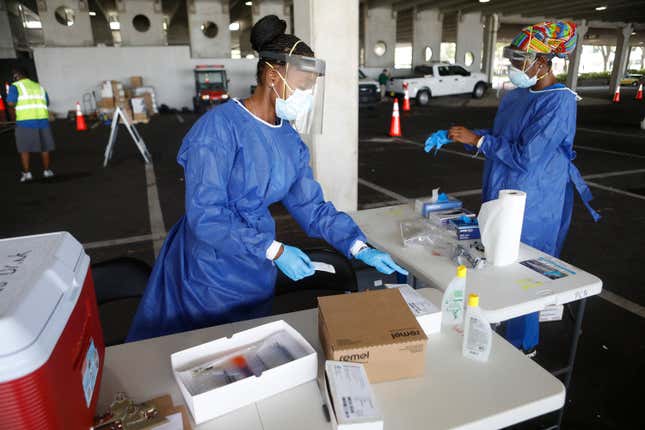
It’s no secret by now that the coronavirus has had its most outsized impact on marginalized communities: Throughout the country, African American, Latinx and Native communities have suffered disproportionately from the coronavirus, as structural inequities have magnified the virus’ deadly impact.
With a rush to get a vaccine to market, it will be important to have these groups represented in clinical testing to ensure that the treatment works effectively for those most affected by the virus. But as the Washington Post reports, this kind of participation will be a challenge for groups who already lack access to proper medical care, distrust medical professionals, or both.
First, there’s the sheer number of volunteers needed—according to the Post, this could be as many as 30,000 volunteers from diverse communities for each trial.
“It’s a scientific necessity, but also a moral imperative, as younger people of color die of coronavirus at twice the rate of white people, and Black, Hispanic and Native Americans are hospitalized at four to five times the rate of white people in the same age groups,” writes the Post.
This being the case, if vaccine trials comprise mostly 20-somethings or white college graduates, as is the case in other medical trials, “it will not give us the information we need,” Director of the National Institutes of Health Francis Collins said.
But to do this, there needs to be special engagement with communities of color, particularly Black communities.
From the Post:
Researchers leading the vaccine effort are convening community advisory boards to understand how to tailor messages and communicate respectfully with a number of at-risk groups, including Native Americans, Blacks, Latinos and older people.
Small details will be critical. Brochures or ads for clinical trials must be available in multiple languages. They must depict minorities, but not just as test subjects. Materials prepared for tribal leaders and ethics specialists in one Native American community may need to answer different questions than those prepared for another, said Michele Andrasik, a senior staff scientist in the Vaccine and Infectious Disease Division at the Fred Hutchinson Cancer Center.
Early engagement is key, say experts who have done outreach to marginalized communities in the past. There are also recent examples of what this kind of engagement should look like and what it can accomplish. The Oakland, Calif.-based Reverend Rob Newells, an HIV activist and Black AIDS Institute’s new Director of National Programs, points to the HIV/AIDS epidemic of the early ’90s for lessons. Early breakthrough trials for HIV treatment regimens were dominated by white, gay men. Subsequently, their communities were first in line when these drugs started becoming more widely available.
“The Black people in Oakland didn’t really know about it, hadn’t been learning about it for a couple years,” Newells told the Post. “We know from that experience that we have to engage people early in the research end of it, so by the time something gets approved, it’s not something brand new. I think it’s going to take time to talk to people about vaccine research.”
But therein lies one challenge: With so many trial details being finalized, it’s been difficult to have these early conversations. The unprecedented focus on speed also leaves many questions open—like whether people from Black communities are helping to shape and layout priorities for these trials.
This is needed to help overcome a built-in distrust of the medical community, one the profession has earned through centuries of harm enacted on Black bodies in the name of science.
Enslaved Africans who ran away from plantations suffered amputations to treat “drapetomania,” or “runaway slave syndrome.” A recent ProPublica investigation found a disproportionate number of Black Americans receive amputations in those same counties to this day. The Tuskegee syphilis study famously administered syphilis to Black men without their consent, subsequently denying them treatment for the disease. In Puerto Rico, low-income women died while participating in early testing of the birth control pill; as another Washington Post article notes, no autopsies were conducted to see if their deaths were linked to the drug, “which was given in much higher doses than it is today.”
Roshon Green, who works as a diversity educator for a health plan, perfectly articulated the issue with appealing to Black communities now, after generations of neglect.
“Now, all of a sudden, you come up with the vaccination and it’s supposed to work, and work well, and you want to try it on us? You haven’t paid attention to us for years,” Green said. “You never care about us, and all of a sudden, you have a vaccination and you want to save us? No way.”
Like many others, Green plans to wait at least until vaccine trials are done before she signs up for any coronavirus treatments. In order for researchers and scientists to build the kind of trust necessary to ensure Black people are represented in the trials, open communication and targeted messaging, delivered by trusted figures within Black communities, will be key. But, she adds, there also needs to be an acknowledgment of the inequality that has plagued America’s healthcare system, and how that has contributed to the disproportionate suffering African Americans have endured with regard to COVID-19.
That kind of work will be difficult, but it needs to be done. As Consuelo H. Wilkins, Vanderbilt University’s Vice President for health equity research at Vanderbilt University Medical Center told The Post:
“It’s more important now than ever that we have minorities included. We should be jumping over mountains to try and make this work.”

